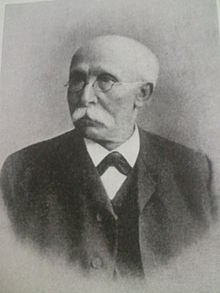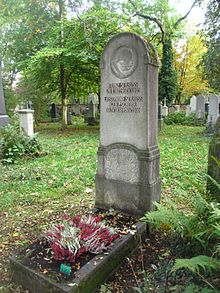Franz Strauss
Franz Joseph Strauss (born February 26, 1822 in Parkstein ; † May 31, 1905 in Munich ) was a German horn player and composer . He was one of the most respected French horn virtuosos of his time and is the father of Richard Strauss .
biography
He was born the illegitimate son of gendarme Johann Urban Strauss and Maria Anna Kunigunde Walter in the small town of Parkstein near Weiden in the Upper Palatinate . Since he was officially recognized by his father as his child, he was given the family name Strauss, even though his parents were not married. Franz Strauss grew up with his uncle, the musician and tower keeper Johann Georg Walter in the Upper Palatinate. Even as a small boy he had to perform in restaurants and was made familiar with the hardship of being a musician at an early age.
At the age of 15 he became guitarist in the court orchestra of Duke Max, then an apprentice in the opera orchestra of the same court. He soon took over the solo horn alongside Friedrich Sendelbeck and was finally appointed horn player at the Royal Bavarian Court Orchestra in Munich .
In mid-1851 he married Maria Seiff, daughter of the music master in the 1st Bavarian Artillery Regiment. When he was 32 years old, his first wife and two children died of cholera in 1854. More than ten years later, in 1863, Franz Strauss remarried, Josephine Pschorr, daughter of the “beer baron” Georg Pschorr . Their son Richard was born in 1864. They also had a daughter, Berta Johanna.
In 1871 Strauss became a French horn teacher at the royal music school in Munich, where he received the title of professor in 1883 and taught very successfully at the institute, which was promoted to the Academy of Music in 1892, until 1896, after he had retired as a court musician in 1889. He also made a name for himself as a conductor and composer of dance music by leading the amateur orchestra " Wilde Gung`l " from 1875 to 1896 and raising it to a remarkable level. His son Richard played first violin there for a while after graduating from high school and composed some works for this orchestra.
The grave of Franz Strauss is located in the old southern cemetery in Munich (grave field 21 - row 3 - place 21) location .
Cooperation with Richard Wagner
Franz Strauss had a very conservative taste in music, above all he adored the Viennese classics Haydn , Mozart and Beethoven . He had an aversion to the music of Richard Wagner , but is said to have supported him in the composition of the so-called Siegfriedrufes, although Wagner had little contact with the Munich orchestra at the time of composition. The Wagner tuba is also said to have emerged from a collaboration between the two.
Works
His Horn Concerto, Op. 8 , obviously served his son as a model for his Horn Concerto, Op. 11 , in terms of structure and subject matter , because in addition to the structural similarity there are strong parallels to the theme of the third movement.
Among other things, he wrote another horn concerto (No. 2 op. 14) as well as so-called “character pieces” and “light music” for his Munich house orchestra: Fantasy on the waltz of longing for horn & orch., Les Adieux f. Horn & Orch. Op. 2, original fantasy op. 6 for horn & orch., Further pieces for horn & piano and horn quartets.
Web links
- Works by and about Franz Strauss in the catalog of the German National Library
- Sheet music and audio files by Franz Strauss in the International Music Score Library Project
- Biography at the International Horn Society (English)
Individual evidence
- ↑ Family news - trusted couples , in: Der Bayerische Landbote , No. 156, June 5, 1851, p. 768 ( online in the Google book search)
- ^ Richard Strauss-Blätter , Issues 1–4, Internationale Richard Strauss-Gesellschaft, 1979, p. 63
- ↑ Population display , in: Munich Official Journal , No. 67, August 30, 1863, p. 708 ( online in the Google book search)
- ^ Knerger.de: The grave of Franz Strauss
| personal data | |
|---|---|
| SURNAME | Strauss, Franz |
| ALTERNATIVE NAMES | Strauss, Franz Joseph (full name) |
| BRIEF DESCRIPTION | German horn player and composer |
| DATE OF BIRTH | February 26, 1822 |
| PLACE OF BIRTH | Park stone |
| DATE OF DEATH | May 31, 1905 |
| Place of death | Munich |

